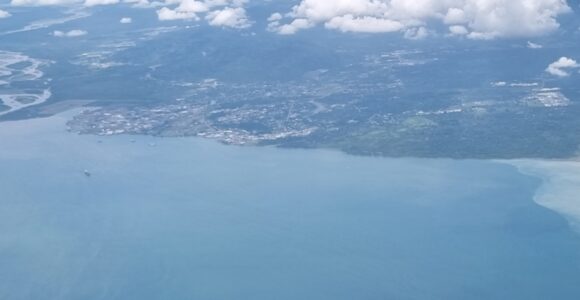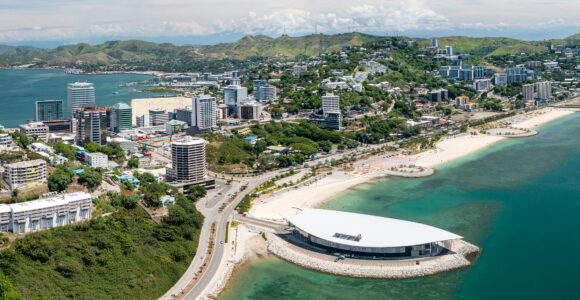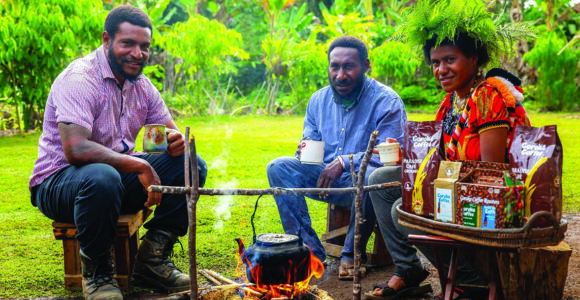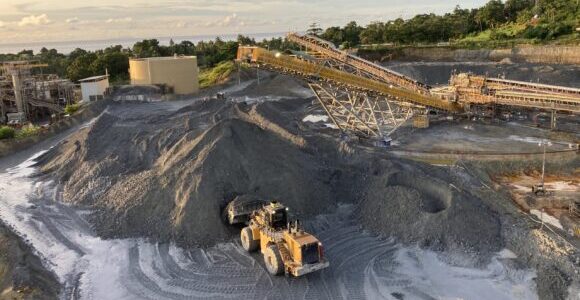Opinion: Give Papua New Guinea agriculture the break it needs
Paul Barker argues for a far greater emphasis on Papua New Guinea’s largest most widespread economic activity—agriculture.
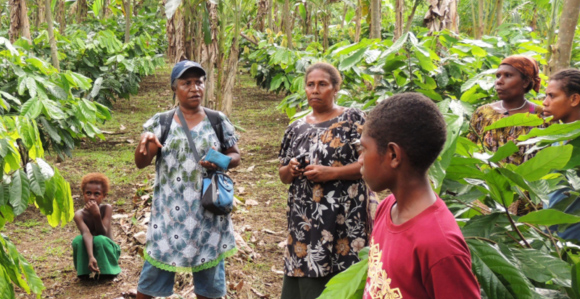
An extension officer explaining effective management of cocoa blocks and containing the cocoa pod borer in East New Britain Province. Credit: Paul Barker
Lip service is often paid to the importance of the agriculture sector, which provides the livelihoods for over 80% of Papua New Guinea’s population. Concern is also expressed at the level of urban population growth and the limited capacity of PNG’s towns to absorb such numbers.

The Institute of National Affairs’ Paul Barker
Yet, for years, successive governments have largely ignored the needs of rural households, scandalously raising, then dashing, hopes by setting up overdue sector support funding (notably, the National Agriculture Development Plan) and then largely wasting it.
The farmers’ associations, like the Rural Industries Council, could see this coming and recommended a transparent mechanism, but this was ignored.
Sadly, over the years, PNG’s various reputable agricultural institutions have been undermined or left to deteriorate with inadequate financial support, poor management and oversight. PNG’s farmers’ strong need for sound professional support and advice, provided through research and practical field experience, has not been met.
The sector’s institutions certainly need reform to make them accountable, principally to PNG’s own farmers. Some can certainly be merged, and the Department of Agriculture and Livestock converted into a largely producer-controlled, professional and responsive organisation.
But neither agriculture’s prospects, nor other industries (including manufacturing or tourism), can be guaranteed unless the economy is competitive.
The new Government’s commitment and focus on infrastructure, law and order, education and health, and especially shifting funds to the Districts, sustainable development and diversification is a welcome and overdue shift in favour of ordinary PNG households and rural areas, including suffering farmers (if the capacity is there to implement the bold aims).
Whether they are rural or peri-urban farmers/gardeners, PNG’s producers require:
- Land (usually just a few hectares), with adequate tenure security to make long term commitments
- market access (that they are sufficiently close to market outlets, or a reliable road, air or shipping service to get produce out without it deteriorating unduly)
- adequate price, which in turns requires
- suitable and consistent world or local market, which in agriculture is often not the case. Stabilisation schemes were provided hitherto in PNG for some major crops to reduce price/income fluctuations
- suitable exchange rate (ie that the kina is not too strong against the currency—often US dollars for cash crops—in which the product price is set). With major influxes of foreign exchange into PNG for resource projects, the kina tends to appreciate, undermining farmer prices and returns.
- safety, security and low risk of produce theft
- availability of quality and pest/disease resistant planting material
- skills (in production, marketing and business)
- market information and know-how, especially entailing new material or how to add value
- access to improved producer support, through cooperatives, group marketing and private partnerships
- access to savings, credit and advice
- risk minimisation through crop diversification, stabilisation or support arrangements when prices fall below a certain threshold, and insurance
Now is the chance for government to demonstrate that it recognises the critical role of agriculture in providing broad household needs and income, as well as 30% of GDP and sustainable production and exports.
PNG has millennia of agricultural production and skills behind it. It has good agricultural land. The country has no option but to foster its agricultural sector and associated downstream processing and value-adding, both as it provides sound long term and broad-based opportunities for the majority of the population, but also because there are no options which will absorb its fast-growing workforce for the foreseeable future.
But neither agriculture’s prospects, nor other industries (including manufacturing or tourism), can be guaranteed unless the economy is competitive.
The cost of living is extraordinarily high, even for a developed country. Going for top quality niche products is one way to overcome high costs, but it’s crucial that these overall costs are reduced to really increase opportunities.
Many of these costs fall in the category of ‘public goods’ provided by the State. Poor roads, policing, utilities, extension services etc undermine business and opportunities, but could be addressed if government uses its revenue much more effectively and accountably.
Now is the chance for government to demonstrate that it recognises the critical role of agriculture in providing broad household needs and income, as well as 30% of GDP and sustainable production and exports.
Let this be on the basis of wide and effective industry consultation, however, rather than driven from above, or by some cronies or lobbyists pushing their own barrel.
Give the agricultural sector a chance, by first listening to those who live and work in it.
Paul Barker is Director of the Papua New Guinea Institute of National Affairs, a privately funded, non-profit think-tank based in Port Moresby.

